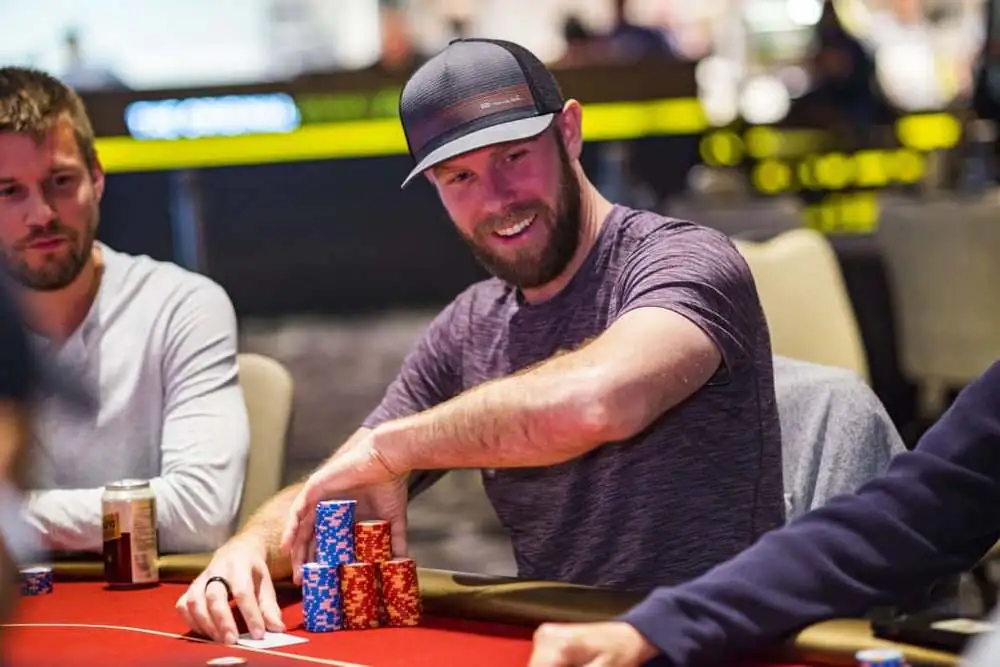The Poker Lifestyle: Will It Wreck You?

-
T&Cs Apply | Play Responsibly | GambleAware
18+ | Play Responsibly | T&C Apply
-
T&Cs Apply | Play Responsibly | GambleAware
+18 / T & C apply / Play responsible

- Fact Checked by: PokerListings
- Last updated on: July 23, 2025 · 8 minutes to read
Table of Contents
The most important, and possibly hardest, part of playing poker professionally is controlling excesses and living a healthy lifestyle.
“The cardinal sin in poker, worse than playing bad cards, worse even than figuring your odds incorrectly, is becoming emotionally involved.
“While the game requires that you fully engage with other players at the table, that you pay attention to their quirks and personalities, you’re not supposed to identify with them in any way.
“You are, in other words, expected to empathize with your opponents while remaining devoid of all compassion. It is very hard to do.”
-Katy Lederer
It’s very easy to fall into the traps of the poker lifestyle and ignore its perks. To be successful at anything, you need to have balance. If you lose balance in your life, everything you do will suffer in some way. I wish I could say that living a good poker lifestyle is an easy thing to do, but it’s not.
A little while back I moved across the world and took a long break from poker. My lifestyle was killing me, and I didn’t have the willpower to fix it. When you realize you have a problem, it only becomes an issue if you don’t work on resolving it.
The Traps of the Poker Lifestyle
The traps you’ll run into will all come at you at once. Once you let one of them get a foothold, the rest will catch up with you in no time. It is important to be very diligent and make sure you steer clear of all of these.
Overwork: The biggest trap that every single poker player I have ever met has fallen into is overwork. It’s almost impossible not to fall prey to this tendency. It seems highly ironic, considering the reason most of us start playing professionally is that we don’t want to have a regular job.
When you’re winning, you want to maximize it. I’m not saying this is a bad thing at all; I follow Phil Ivey’s maxim that if he’s winning he won’t leave the table until he has all of the chips or he is too exhausted to play any further.
When you’re losing, you want to make your money back. It becomes an obsession. You can’t function in the real world because your latest loss is gnawing at you. All you can think about is getting back into the game to make back your losses.
This is not the same as chasing losses; this is playing strong poker with the understanding that your game comes down to hours. The more hours you put in, the more money you will make. Rebuying during a session is not a mistake; all professional players bring multiple buy-ins with them to the game.
If you’re playing good poker and just happened to lose in a bad situation, it stands to reason that you will still make back what you lost, or at least a portion of it, by rebuying. This is only true if you are still in a state to play good poker and you didn’t lose the first buy-in because you’re at a table you cannot beat.
If you don’t stop playing while you’re winning and you don’t stop playing while you’re losing, then you’ll perpetually be playing poker.
Imagine sitting down at a late-night online session with A-K, quickly building a solid chip stack over a few hours. You’re feeling great, so you decide to keep going. As morning approaches, you find yourself chasing a sudden downswing with the same intensity. You’re determined to recoup losses, but fatigue sets in, your reads grow hazy, and you start making suboptimal calls just to get back even. This cycle continues until you realize you’ve been playing for 16 hours straight with no real break or chance to reset.
Who’s Around You: I was at the point where I was playing between 50 and 80 hours a week. For over a month, I rarely left my room or my computer chair for that matter. When you’re playing this much online poker, you have absolutely no social interaction. As you can imagine, this is simply not healthy.
Even if you go to a cardroom, you are spending all of your time sitting at a table with degenerate gamblers and greasy scum. Not all poker players are like this, but enough of them are to make your life at the table less than spectacular.
Sleep Schedule: This one is hard to work around. The best games usually happen at night. That’s when the rest of the world has gotten off work. When the fish come out to play is when you should be going out fishing.
If you’re starting your day’s work at 11 p.m., then you’re basically working the graveyard shift. I would consistently be getting home as my roommates were getting up and making breakfast on their way to work in the morning.
If you’re up all night, you end up sleeping all day. You never see the sun, you do nothing active, and you see no human beings outside of poker.
Nutrition/Fitness: It’s very important to keep yourself healthy. I know a guy who dropped out of his third year of a kinesiology degree to play poker full time. The guy is now pushing 300 pounds.
When all you do is sit at a table or your desk and eat, drink and say a few words, it’s not rocket surgery to expect that you’re going to be out of shape and put on some weight. The less healthy you are, the worse you feel – both mentally and physically. The worse you feel in life, the worse poker you’re going to play.
You need to concentrate on eating right and getting exercise. It doesn’t matter how you go about doing it, just as long as it gets done.
Consider a player who sets aside one hour before each session for physical activity. Even a brisk walk or a quick gym workout can boost energy levels and sharpen mental focus. After wrapping up a tight tournament run, they spend an additional hour decompressing—perhaps reading a book unrelated to poker—to clear their mind and maintain mental clarity before the next session.
Alcohol: No one who is serious about their professional job drinks at work. A lawyer who drinks all day at his desk is called an alcoholic. Just because your office is a poker room (or your den) doesn’t mean you’re exempt.
If poker is a skill game that relies entirely on you making educated, quick, smart and efficient decisions, then it is ludicrous to think you would be able to drink and still play at full capacity.
Balance: You need to have some sort of social life outside of poker. If all you do is go golfing with people you play poker with, then you’re not much further along at all. You want balance – people who have nothing to do with the game.
Some Warnings about Girlfriends
Guys, no girl likes to feel she’s less important than a game. It can be hard to carry on a relationship if you’re working 80 hours a week.
You need to spend time with the lady and you can’t be thinking or talking about poker when you do. If she has nothing to do with poker, she’s not going to want to hear about it at all.
The biggest conflict you’ll run into is with Friday and Saturday nights. These are the nights where your girlfriend and other friends will want to be going out. They’re the standard going-out nights.
Unfortunately, for the same reason, this is the night where all the people who want to go out, get drunk and head to the casino stumble into the poker room.
Friday and Saturday nights are always the busiest and the best times to make money in a poker room. For this reason, you will almost always want to be working on them. This will cut a huge swath into a normal social life.
Playing poker professionally can be a rewarding, exciting and entertaining life, but you have to be willing to take active steps toward doing it well. Work out a plan, write it down and stick to it.
Sustainable Poker Career
Even seasoned professionals need to consistently reassess their routines, strategies, and mental approach to thrive in a highly competitive field. A modern poker environment demands more than raw talent or an aggressive style; players must integrate stress management and data analysis while recognizing the psychological hazards of long sessions.
Streamlining Your Study Schedule
Serious players realize they can’t rely on in-game experience alone. A deliberate study routine, structured around session reviews, database analysis, and discussion with trusted peers, can reveal critical leaks and improve overall decision-making. By breaking down memorable hands—such as those involving triple-barrel bluffs or three-bet pots with marginal holdings—players gain deeper insight into EV calculation, pot odds, and range balancing. This refined understanding can help adapt to evolving strategies in live and online games, setting the foundation for consistent, measured growth.
Integrating Mental Game Work
Poker is as much a psychological battle as it is a technical one. Advanced pros incorporate mental game training—such as mindfulness exercises, guided focus routines, and post-session cooldowns—to stay sharp and minimize tilt. This approach can involve analyzing tendencies to overplay draws after a big loss or recognizing emotional triggers that arise when facing aggressive opponents. By internalizing these techniques, players can protect their edge in both cash games and tournaments, maintaining peak performance over countless hands.
FAQ
What is the poker lifestyle?
The poker lifestyle encompasses all the day-to-day habits, environment, and challenges that come with playing poker professionally. This includes keeping irregular hours, managing bankroll swings, and maintaining emotional balance amid the highs and lows of the game.
How does overwork affect a poker player’s performance?
Overwork often leads to fatigue and less clear decision-making. Logging excessive hours at the table without breaks can result in suboptimal play, difficulty maintaining focus, and a tendency to chase losses instead of playing with precision.
What are some ways to avoid social isolation when playing full time?
A helpful approach is balancing poker-related activities with outside hobbies and relationships. Spending time with friends who are not involved in poker and maintaining interests away from the table can prevent isolation and burnout.
How do modern players implement study routines effectively?
Modern players schedule regular study blocks outside of active sessions. They review hand histories, use tracking software or HUD data, discuss complex hands with peers, and integrate advanced concepts like EV calculations to refine their strategy.
How can a poker professional maintain a healthy sleep schedule?
Many establish a routine that fits late-night sessions, ensuring they still get consistent, sufficient rest. They may use strategic naps, bright-light exposure during waking hours, and plan breaks between sessions to keep their minds and bodies recharged.
Why is mental game work important for professional players?
Mental game work helps players manage tilt, handle stressful situations, and maintain focus during long hours at the table. Techniques like mindfulness, focused breathing exercises, and comprehensive cooldown routines safeguard emotional control and decision-making.
Is it possible to maintain relationships while dedicating weekends to poker?
Yes, although it requires clear communication and compromise. Professionals often set aside specific days or hours to spend with loved ones and make a conscious effort to switch off from poker discussions during this time. This balance requires planning and understanding from both sides.
-
- 100% up to $2000
T&Cs Apply | Play Responsibly | GambleAware
18+ | Play Responsibly | T&C Apply
-
CoinPoker4.1
- 33% Weekly
- 150% up to 2000$
T&Cs Apply | Play Responsibly | GambleAware
+18 / T & C apply / Play responsible
-
Stake.US Poker4.3
- Rakeback 5%
- $55 Stake Cash + 260K Gold Coins
T&Cs Apply | Play Responsibly | GambleAware
18+ | Play Responsibly | T&C Apply
-
- 100% up to $1000
T&Cs Apply | Play Responsibly | GambleAware
T&Cs Apply | Play Responsibly | GambleAware
-
T&Cs Apply | Play Responsibly | GambleAware
18+ | T&Cs Apply | Play Responsibly | GambleAware




User Comments
I have felt both the up’s and down’s of poker. I really do love the game, but i think it is a wise decision to give it away. I’ve put on weight, i feel antisocial, and i have found my temper flares easily after a string of bad beats which has trickled into my normal life. Be cautious is all i have to say!
awesome article !!!
Thanks Mo. I wrote it because I’ve lived all of these mistakes. If one person learned something from it, that’s more than worth the effort.
remarcable article, one of the best of addressibg the every day problems of poker players, thank you